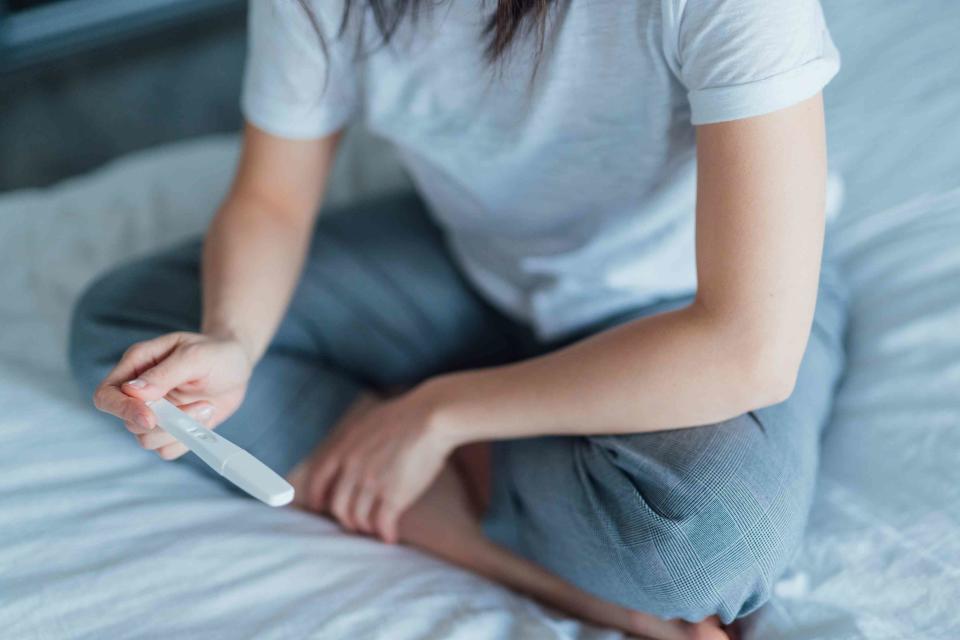Can You Get Pregnant While on Your Period?
Which Days of Your Period Pregnancy Statistically Could Happen

Oscar Wong / Getty Images
Medically reviewed by Cordelia Nwankwo, MD
Getting your period (menstruating) is usually a sign that you are not pregnant. While it is possible to become pregnant from unprotected sex at any time during the month, you are unlikely to conceive during your period.
The most likely time of the month to become pregnant is during ovulation, when an egg is released from the ovaries. If sperm are present to fertilize it, the egg will implant into the wall of the uterus (womb) and start to develop. For people with a 28-day menstrual cycle, ovulation occurs around day 14, midway in the cycle.
Some people have a greater chance of becoming pregnant during their period than others. People with short or irregular menstrual cycles may start to ovulate toward the end of their period, making pregnancy possible at that time.
This article discusses the likelihood of becoming pregnant during your period and at other times of the month.

Oscar Wong / Getty Images
It is possible to experience bleeding at the beginning of pregnancy that can be confused with a monthly period. Implantation bleeding occurs when a fertilized egg implants into the uterine wall (the endometrial lining). It is usually lighter than period bleeding and may only cause spotting. It typically occurs about six to 12 days after fertilization. It’s estimated that about 15% to 25% of pregnant people have bleeding in the first trimester.
Pregnancy During Period: What Are the Chances?
The chances of becoming pregnant during your period are low. It is unlikely that you will become pregnant immediately after having sex during your period because your body is likely not ovulating yet. However, if you have a short cycle, you could begin ovulating close to the end of your period.
The average menstrual cycle is 28 days, but cycles between 24 to 38 days also are considered normal. For people with an average 28-day menstrual cycle, ovulation occurs around day 14. However, this could vary. While uncommon, some people experience vaginal bleeding during ovulation, which sometimes is mistaken for a period.
After unprotected sex, sperm can survive for about three to five days. This means that having sex toward the end of your period could result in a fertilized egg if your body ovulates shortly after your period ends. On average, people usually ovulate about seven days after their period ends.
One study of 5,830 people who menstruate examined the odds of becoming pregnant at different times of the month. Based on the results, these are the chances of becoming pregnant during your period:
Day 4: On the fourth day of your period, you have a 2% chance of being within a fertile window.
Day 12: On the 12th day of your cycle, you have a 58% chance of being in a fertile window. If you have sex at the end of your period, there is a chance that the sperm could fertilize an egg around this time.
If your menstrual cycle is regular, subtract 18 from the total number of days in your shortest cycle. Take this number and count ahead that many days from the first day of your period. The day you land on is most likely your most fertile day.
Another method is subtracting 11 from the total number of days in your longest cycle. Take this number and count ahead that many days from the first day of your period, which is likely your most fertile day.
Factors That Influence Pregnancy Around Menstruation
The odds of becoming pregnant during your period depend on your menstrual cycle. If your cycle is considered short or irregular, there is a greater likelihood that you could ovulate while still bleeding. This could lead to pregnancy.
Several factors affect the regularity and health of your menstrual cycle. Factors that influence your menstrual cycle and when you experience monthly bleeding include:
Age
Ethnicity
Taking hormonal birth control
Stress
Sleep quality
Weight changes
Excessive exercise
Smoking and exposure to secondhand smoke
Alcohol use
Health Conditions
Health conditions that can cause irregular or missed periods include:
The only way to know if you are pregnant is to take a pregnancy test. The best time to take a test is one week after your missed period. This is when the test will be most accurate. Possible early pregnancy symptoms include headaches, fatigue, and breast tenderness. These symptoms are also common before and during menstrual periods.
How to Prevent Pregnancy During Periods for Sure
Abstaining from sex is the only way to guarantee that you do not become pregnant during your period. To significantly lower your odds of becoming pregnant during your period, use an effective birth control method, including:
Sterilization: The most effective method of birth control is a male vasectomy or female tubal ligation or occlusion. These methods should prevent pregnancy forever.
Intrauterine device (IUD): An IUD is placed inside the body and releases low levels of hormones to prevent pregnancy.
Hormonal birth control: Hormonal birth control methods can include birth control pills, a patch, a shot, and a vaginal ring.
Barrier methods: Barrier methods like condoms and diaphragms block the sperm from reaching the egg. Condoms also prevent sexually transmitted infections (STIs).
Summary
Anytime you have unprotected sex, there is a chance of becoming pregnant. However, the odds of becoming pregnant during your period are very low. This is because ovulation usually does not occur during menstruation.
For a person with a 28-day cycle, ovulation usually occurs on day 14. If your menstrual cycle is short or irregular, you may experience ovulation shortly after the end of your period. This raises the chance of becoming pregnant from having at that time. To lower your odds of becoming pregnant during your period, either abstain from sex or use an effective birth control method.

